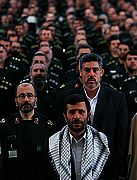Ahmadinejad Now Targets the Armed Forces
» Sell Your Assets, Pay Taxes
While Iran’s leader ayatollah Khamenei and his appointees call on the public to resist the pressures of international sanctions through “resistance economy” on a daily basis and at the same time threaten Western countries and denounce any talks over the country’s nuclear program, controversial president Mahmoud Ahmadinejad whose administration has resorted to raising taxes to meet the loss of oil revenues and budget shortages, has now asked members of the Revolutionary Guards Corps and the regular military to sell their assets and real estate to meet their own budgets.
Speaking at a seminar on “The Reconstruction Base of Revolutionary Guards” to an audience of senior military leaders, Ahmadinejad applauded his government’s policies in the sphere of production and the negated the impact of international sanctions and said, “They thought that if they tied our hands in some areas we will not have other resources. What is clear is that we have no shortage of resources.”
Implicitly addressing military commanders of the armed forces he said, “As had been the long-standing practice, all government agencies until recently looked upon the state treasury as a source of income and everyone strived to get a larger share of the budget. But since this system had been created by Westerners, they (Westerners) had pinned their hope in it. But our country is full of resources and these are so vast that if they are utilized properly, the state treasury will be miniscule in comparison.”
Ahmadinejad described an organization called ‘Government Assets” through which the government generated revenue by selling its real estate property called on the Revolutionary Guards also to meets its financial needs to sell some of its lands and real estate. “There are many such instances in the Guards and the military. For example, Ghale Morghi or the Dooshan Tapeh air base which I think has about 65 hectares of land within a city can be used for this purpose. And there are other vast lands in various other cities.”
This request from the president comes as the Revolutionary Guards, which is undisputedly the most powerful military force in the country that is run directly by ayatollah Khamenei, and which has been asking Iranians to persevere in their resistance against poverty, inflation and sanctions through the slogan of “resistance economy,” has till now not said a word about its own plans to curtail spending and shorten its current budgets in response to the economic hardships facing the country.
The only reference to this is what Hassan Firuzabadi, the chairman of Iran’s armed forces chief of staff said recently in the presence of Elm va Sanaat University academicians, “After the sanctions, the budget of the armed forces faced a 10 percent risk and I told them to do their job with a 10 percent budget reduction.” Later in the same interview he qualified his statement by saying, “I do not mean that the budget will be cut or not paid by 10 percent. I am only saying there is a 10 percent risk.”
Why Do You Not Pay Taxes
Ahmadinejad’s most recent point about the military comes after the Shabake Iran website, belonging to the Iran Press Institute (Moasese Matbuati Iran) published a report on the drop of oil revenues and asked that tax waivers that applied to bases and economic organizations under the control of the Revolutionary Guards be cancelled.
This government organization used the “resistance economy” notion launched by Khamenei and said that Ahmadinejad’s “administration wanted to modify to strengthen the country’s economy by reforming its taxation system as a way to arrive at that economic model. But this decision should not create concerns for businessmen, the private sector and government staff who have been providing the largest segment of the tax revenues. So because the government intends to expand the taxpaying base by including the powerful foundations and organization which until now have been exempt from this. In other words the government wants to look into the hidden economy of the country.”
The report continued, “The devoted public has had this question as to why must the powerful economic institutions such as the armed forces that are engaged in economic activities be exempt from paying taxes. Why must large economic centers such as Bonyad Taavone Sepah (The Revolutionary Guards Cooperative Foundation), Bonyad Taavone Naja (The Cooperative Foundation of the Armed Forces), Khatam al-Anbiya Force, etc which are engaged in large economic activities. Why do they not provide to the resistance economy? Why are they exempt instead of contributing to the economy? It appears that now is the best time to implement the tax reforms and launching resistance economy.”
This story also refers to a 2011 study prepared by Majlis’s research unit and quotes it to say, “In the last 10 years the economic activities of Mostazafan Foundation, Komite Imdad, Bonyad Shahid foundation, Bonyad 15 Khordad, Islamic Propagation Organization, and the Cooperative Foundations of the armed forces have been exempt from paying taxes. These were added to others such as the Social Security Organization, Jahad Sazandeghi organization (i.e., Nasr and Esteghlal), Sazandeghi bases, and the Astane Ghods Razavi Association which were already exempt from paying taxes. Now is the time to ask why these organizations must not pay taxes.”
Earlier this year, the minister of economy Shamsedin Hosseini had said that if oil revenues become a problem then taxes will be increased to make up for the loss.
Prior to him, Ali Asghari, the head of Iran’s tax organization had also announced that taxes would be raised to meet the goals of resistance economy. In another more recent talk, Hosseini last week again stressed raising taxes to meet budget shortages. He said, Taxes are the healthiest and best way to run a country,” and called for tax reforms.


